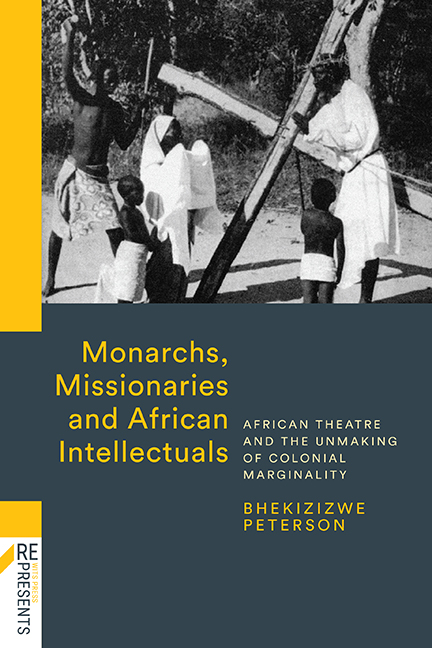 Monarchs, Missionaries and African Intellectuals
Monarchs, Missionaries and African Intellectuals Book contents
- Frontmatter
- Dedication
- Contents
- Preface and Acknowledgements
- Note on Zulu Orthography
- Introduction: Staging the (Alien)nation: African Theatre and the Colonial Experience
- 1 ‘All Work and No Play Makes Civilisation Unattractive to the Masses’: Theatre and Mission Education at Mariannhill
- 2 ‘I Will Open My Mouth in Parables’:Accounting for the Crevices in Redemption
- 3 Parallel Time, Parallel Signs, Discordant Interpretations
- 4 B.W. Vilakazi and the Poetics of the Mental War Zone
- 5 The Bantu Men’s Social Centre: Meeting the Devil on his own Ground
- 6 The Bantu Dramatic Society According to a Gossip Columnist
- 7 Contesting ‘The Bantu Imagination’: The British Drama League & The New Africans
- 8 H.I.E. Dhlomo: Measuring the Distance Between Armageddon and Revolution
- 9 ‘The Black Bulls’: Assembling the Broken Gourds
- 10 Hegemony and Identity: What a Difference ‘Play’ Makes
- Notes
- Bibliography
- Index
5 - The Bantu Men’s Social Centre: Meeting the Devil on his own Ground
Published online by Cambridge University Press: 12 October 2021
- Frontmatter
- Dedication
- Contents
- Preface and Acknowledgements
- Note on Zulu Orthography
- Introduction: Staging the (Alien)nation: African Theatre and the Colonial Experience
- 1 ‘All Work and No Play Makes Civilisation Unattractive to the Masses’: Theatre and Mission Education at Mariannhill
- 2 ‘I Will Open My Mouth in Parables’:Accounting for the Crevices in Redemption
- 3 Parallel Time, Parallel Signs, Discordant Interpretations
- 4 B.W. Vilakazi and the Poetics of the Mental War Zone
- 5 The Bantu Men’s Social Centre: Meeting the Devil on his own Ground
- 6 The Bantu Dramatic Society According to a Gossip Columnist
- 7 Contesting ‘The Bantu Imagination’: The British Drama League & The New Africans
- 8 H.I.E. Dhlomo: Measuring the Distance Between Armageddon and Revolution
- 9 ‘The Black Bulls’: Assembling the Broken Gourds
- 10 Hegemony and Identity: What a Difference ‘Play’ Makes
- Notes
- Bibliography
- Index
Summary
In less than a decade after Mariannhill's exploration of the pedagogical and social uses of theatre, similar experiments were championed by whites and blacks as being long overdue in the Witwatersrand region. As in the case of Natal, a range of institutional and intellectual resources had to be set in place by the missionaries and the state to effect the desired ends of social control. The protagonists on the Rand were the American Mission Board (AMB) and the Reverend Ray Phillips who headed its social work division. Phillips was attuned to Huss's ideas and programmes on recreation and also found great stimulation from the activities of the Native Affairs Reform Association in Durban. The efforts of the AMB between 1919 and 1932 went into securing a venue for its various programmes and expanding African support. Key projects emanated from organisations such as the Joint Councils (1921) and the South African Institute of Race Relations (1929) which sought to facilitate interracial co-operation in the light of the Union government's crystallising commitment to segregation and discrimination and the consequent radicalisation of African politics.
The political and social urgency wrought by poverty and unrest rendered the promotion of theatre low on the Board's list of social projects. The same is true with regard to the political agenda of the African middle class in Johannesburg. Their preoccupation during this period was to work out appropriate political strategies and formations to respond to socio-political developments and, in particular, their status as permanent urban dwellers. A measure of the interregnal condition that faced the intelligentsia is indicated by their support of the Transvaal Native Congress, a modern and largely urban-based political formation, while in matters cultural, the highlights of the year were the periodic visits of Reuben Caluza's Ohlange Choir to Johannesburg. It was not until the 1930s that theatre and other forms of cultural expression were to be consciously mobilised in support of nationalist sentiments.
This chapter sets out the initiatives undertaken by Phillips and the AMB that led to the establishment of the Bantu Men's Social Centre (BMSC) and its tangential, but highly significant, interaction with the emergence of motion pictures in South Africa between 1920 and 1940.
- Type
- Chapter
- Information
- Monarchs, Missionaries and African IntellectualsAfrican Theatre and the Unmaking of Colonial Marginality, pp. 119 - 142Publisher: Wits University PressPrint publication year: 2021


